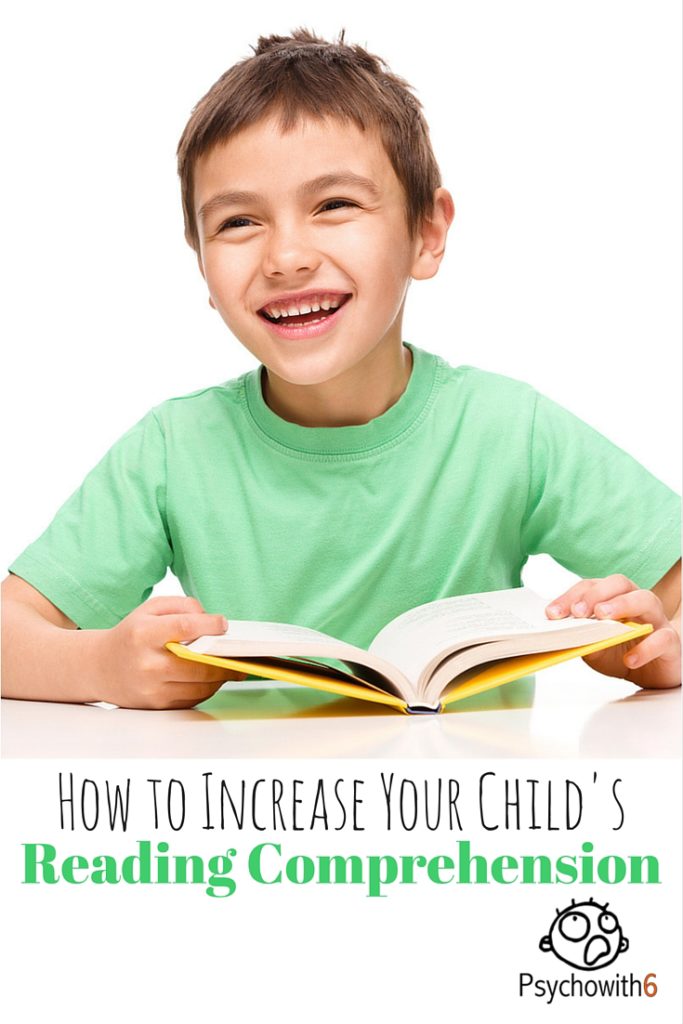 This week I’ve written about how to help your child read and read fluently. The final piece of the reading puzzle is your child understanding what he has read. We want children to read for pleasure frequently, but we also want them to be able to make sense of what they read. Reading comprehension is vital for succeeding in advanced studies.
This week I’ve written about how to help your child read and read fluently. The final piece of the reading puzzle is your child understanding what he has read. We want children to read for pleasure frequently, but we also want them to be able to make sense of what they read. Reading comprehension is vital for succeeding in advanced studies.
Why Your Child May Have Poor Reading Comprehension
If your child is a beginning reader, there are a number of factors that work against her in understanding what she reads.
First, she must expend most of her mental effort in decoding words. Her attention is focused on the words rather than their meaning in context. If you’ve ever been nervous as you read something out loud, you may have noticed that you had no idea what you read. Divided attention can decrease reading comprehension.
Second, he has a limited vocabulary and literary knowledge. Parents may assume their child knows a word when in fact, he does not. To make matters worse, a beginning reader may not ask the meaning of words he does not know. Your child may also be unfamiliar with themes in literature that would help him make accurate predictions about what he will be reading.
Third, your child doesn’t have advanced reasoning ability. He is unlikely to make connections unless they are explicitly stated in the text because of his developmental level. This is also why word problems in math can be difficult for young students.
Regardless of your child’s reading level, there are a number of strategies you as her teacher can use to improve her reading comprehension.
How to Increase Your Child’s Reading Comprehension
Modify the SQ3R method.
Survey: Before reading to your child, look at the book together. Look at the front cover, any description of the book on the back cover, and any chapter titles or headings as you skim through.
Question: Based on your survey of the book, give your child questions that you expect the book to answer. If you will be reading a book about snakes and one of the headings is “Snake Habitats,” suggest that the book will answer the question, “What are snake habitats like?” Encourage your child to give you questions he expects the book to answer.
Read: As you read, point out the answer to a question you thought the book would answer. Be sure to define words that your child may not know. When reading fiction, ask your child what he thinks will happen. Use literary terms that are appropriate to your child’s level like character, antagonist, or climax.
Recite: Stop at the end of a section or chapter and ask your child to explain what happened or what was learned. For example, ask your child why she thinks a character did what she did. If she isn’t sure, review key passages together.
Review: Ask your child to retell the story or content to a family member later in the day. Continue to ask your child to recall key information from what was read later in the week.
Finally, use this Pinterest board for printables and activities that will help improve your child’s reading comprehension.
Follow Mary Engleman’s board reading comprehension on Pinterest.
Be sure to read the rest of the posts in 5 Days to Your Child Becoming a Better Reader and subscribe to Psychowith6 to be notified of the availability of a fun language arts program that will help.








I am homeschooling my 5-year old son and have been thinking that comprehension is an issue, but I am also thinking that my son is just not hearing me when I read to him. What suggestions do you have for me to help him be an active listener. I have asked questions after reading short passages, told him questions that we need to find the answer to, and tried given him things to keep his hands busy. There has been little success. Thank you!
Hi, Debbie! Thanks for your question. I would make sure that you are reading things that are interesting to him. I don’t know if you checked out the first article in this series, but there are good tips there for finding material your son will like.
The second thing you could try is to let him move around as you read. Active kids can sometimes listen better when they are walking around, though it can drive mom batty. LOL I have been shocked to discover that when my kids are up and walking that they are listening.
Finally, you could try playing some listening games with him–things like Simon Says. Here’s a list of some great ideas. http://www.kidzworld.co.za/reading-and-writing/games-for-kids-that-encourage-listening-skills.html
Remember that a 5-year-old’s attention span is really short. It will improve with time. 🙂
I’m also homeschooling my 5 year old twins. Sometimes my twins won’t actually actively listen until they get a question wrong and I have to reread the passage. After that, I have their attention for the next few pages, then they tend to zone out again.
Thanks for sharing that! Getting an answer wrong gets your boys’ attention. Debbie could also motivate her son to get a correct answer with a meaningful reward.